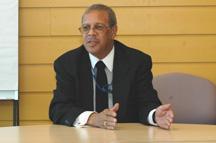McIver favors regional transportation system
Tue, 09/06/2005
Seattle City Councilman Richard McIver supports building a downtown waterfront tunnel to replace the Alaskan Way Viaduct, opposes the monorail, but supports a light-rail line to West Seattle.
McIver is running for his third four-year term on the City Council. His challengers include King County Councilman Dwight Pelz and housing advocate Robert Rosencrantz.
McIver favors a regional approach to the transportation problems of the Seattle-Tacoma-Everett area. It would take a new regional agency to coordinate buses, commuter trains, light rail lines and monorail, he said. McIver spent 2003 and 2004 as president of the Puget Sound Regional Council in addition to his City Council duties, so he's been thinking along regional lines.
"Five bus systems come to Seattle and Seattle controls none of them," McIver said.
A first step toward a regional transit system would be development of a "smart card" that would allow people to pay for rides on all forms of mass transit in the region.
Trying to retrofit the earthquake-damaged Alaskan Way Viaduct would offer only short-term benefit, he said. Besides, no matter how the viaduct is replaced, there's still the need for a $1 billion rebuild of the seawall that separates downtown from Elliott Bay. McIver supports the plan to have the new seawall double as the outer wall of the new tunnel.
McIver also is enthused by the results of San Francisco's efforts to reconnect parts of its downtown to the waterfront.
Tolls probably will have to be collected to help pay for the tunnel, he said, pointing out that tolls paid much of the cost of the existing 520 Evergreen Point floating bridge and Interstate 90. Tolls likely will be used to pay for the upcoming replacement of the trans-Lake Washington span.
McIver wants to work with the state to figure out a new way to distribute transportation money.
The incumbent councilman said he started out as an adherent of the monorail but his support faded as financial problems cropped up.
"It's not an economically feasible means of transportation," he said.
There's not enough money to build the envisioned Green Line, he said. The number of stations could be reduced or the line shortened, but if that happened, it would take about 30 years to extend the system, he guessed.
The two-car monorail trains would have seating for 70 people, he said. That's about the size of two buses.
Another problem with the monorail is it wouldn't "connect regionally," McIver said.
McIver, who is a member of the Sound Transit board of directors, was critical of the board governing the Seattle Monorail Project.
"They've drunk of the Kool-Aid and don't want to walk away from it," he said.
On top of its other problems, the monorail likely will be tangled up in costly lawsuits for many years and doesn't have money to defend itself, he said.
Although he derided the monorail, McIver took credit for convincing monorail planners to move plans for building the guide way farther away from condominiums and apartment buildings in West Seattle. He was unable to get similar changes in Ballard, he said.
He thinks it is time for the public to vote on whether the monorail has a future or not.
The answer to Seattle's transportation woes is King County Metro Transit buses traveling in more bus-only lanes, he said.
As the only minority member of the City Council, McIver feels a responsibility to pursue social justice issues too.
With a goal of overcoming racial and sexual bias, government construction projects used to award a portion of any large contract to women- or minority-owned contractors. But Washington voters stripped away those requirements when a majority approved Initiative 200 a few years ago.
"Why does it cost more money to use a minority-owned firm?" McIver asked rhetorically. It also means fewer apprenticeships for minority and female workers, he said.
He wants to reinstitute requirements that minority- and women-owned contractors get part of large public works contracts.
McIver answered criticism raised by his challengers that he is often absent from City Council meetings.
He sometimes arrives a few minutes late at the meetings, after roll has been taken, and it's usually because he was helping a constituent, he said.
He's been accused of missing meetings in fall, but that's budget time and the City Council always cancels its usual meetings then, he said.
During 2003 and 2004, some of McIver's time was taken up being president of the Puget Sound Regional Council. He's no longer president but is still a member.
He's the only minority member of the Sound Transit board of directors and also sits on the Washington State Housing Finance Commission.
"I'm probably over-extended a little bit, yes," McIver said. He checks the agenda of every meeting and attends if it's important, he added.
McIver claimed credit for the installation of video cameras in Seattle Police patrol cars. That's enabled police officers several times to be exonerated from false accusations made by suspects.
"My leadership style works well," he said. "I don't jump up and down. I bring people together. Maybe I use less energy to achieve more."


